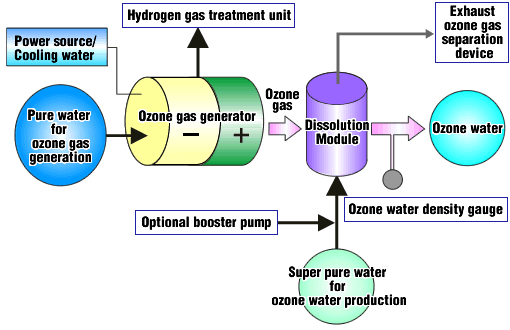
4 APPLICATION FROM OZONE, DID YOU KNOW?
What is ozonated water?
Ozone is a colorless and odorless gas comprising three oxygen atoms. In the gas form, ozone is an unstable molecule that can cause damage to the lungs when inhaled.
When ozone is dissolved in water, the water becomes ozonated and is believed to have some therapeutic effects, including antioxidant and antimicrobial properties and use in dental therapy, cancer treatment, and food safety techniques.
However, most of the studies on ozonated water are outdated, and newer research is needed.
How it’s made
Making ozonated water involves filling a cylinder with purified water while an ozone gas mixture bubbles through it continuously. This occurs for at least 5 minutes until maximum saturation has taken place.
In its gas form, ozone may damage the respiratory system. Ozonated water is easier to handle than ozone gas itself. It may have both industrial and therapeutic uses.
In past decades, ozone was used to treat numerous ailments. Many historical applications were mostly anecdotal and not based on scientific literature, but some claims have been scientifically studied.

Benefits of ozonated water
Over the past 2 decades, numerous studies have investigated the effects of using ozonated water to support health.
Here are some potential benefits of using ozonated water.
1. Cancer treatment and prevention
Cancer treatment can be quite complex. Sometimes, popular therapies like chemotherapy and radiation therapy may not effectively target the tumor.
Research from the early 2000s found that ozonated water may enhance the efficacy of chemotherapy drugs in targeting tumors. However, these findings were based on a rat study, and the treatment has not yet been tested in humans.
Another study from the early 2000s looked at the risk of developing bladder cancer in adults who drank ozonated water compared with chlorinated water. Both techniques are used to disinfect water, preventing the growth of unsafe bacteria and microbes. Based on the results of this study, the risk of developing bladder cancer was lower in those who consumed ozonated water. However, more recent and longer-term studies are needed to support these claims.
2. Dental therapy
Ozone may be used as a treatment option within dentistry, according to more recent research. Some uses include clearing bad bacteria from the mouth and promoting the healing of oral wounds.
One study tested the efficacy of ozonated water on tooth decay as an alternative to a chlorhexidine mouth rinse. It included 23 adults who had salivary samples taken at 7 and 14 days of continued use of ozonated water. Results showed a significant decrease in Mutans Streptococci, a bacterium found on teeth that increases the risk of tooth decay.
Another study found that applying ozonated water to an oral wound sped the healing process by increasing cell turnover.
3. Antioxidant and antimicrobial
Ozone is considered an oxidant, meaning it’s a free-radical-forming substance. It’s an unstable molecule that may damage cells in the body.
Exposure to ozone gas may trigger a stress response in the body. This response may activate the production of numerous antioxidants that help clear free radicals from the body.
A case study of a 62-year-old woman showed the effects of using ozonated water, in addition to antibiotics, to treat a urinary tract infection (UTI). Ozonated water was administered into the urinary tract 3 times over 1 week.
The patient recovered from the UTI, and no reinfection was documented in the period leading up to the 4-month follow-up.
Nevertheless, more research is needed, as this study only looked at one individual who was taking antibiotics in addition to the ozonated water.
Exposure to ozonated water may speed the cell repair process, reducing bacteria and symptoms related to urinary tract infections. In addition to its antioxidant properties, ozonated water may increase microbes’ sensitivity to antibiotic treatment.
4. Food safety and water purification
Ozone’s antibacterial properties and ability to destroy industrial impurities have made it a potentially valuable alternative to chlorine.

In 1901, one city in Germany and another in France were the first to implement the use of ozone to purify drinking water. Today, at least 3,000 cities use ozone to purify their drinking water.
In 1995, the United States Food and Drug Administration (FDA) listed ozone as “generally recognized as safe” in regards to bottled water and coming into contact with food.
According to both older and recent studies, ozonated water may be used to wash fresh vegetables to reduce bacteria on their surface and enhance preservation. However, its use should occur within a controlled environment.
Refer from: Healthline





